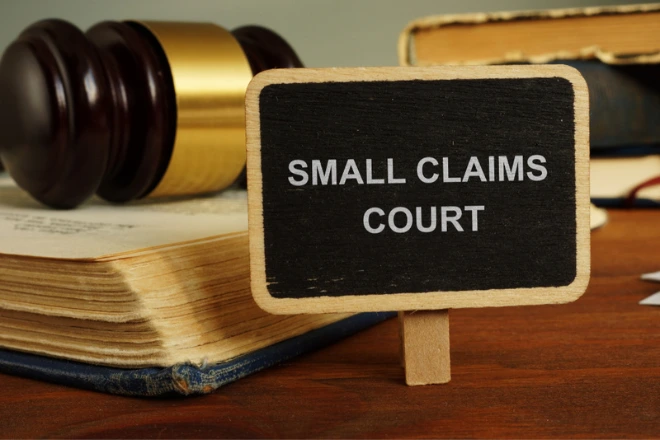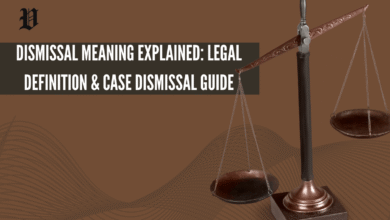Your Guide to Small Claims Court: How to File and Win Your Case

Alright, let’s be real. We’ve all had that sinking feeling. You did the work, delivered the product, or paid a deposit in good faith… and then nothing. Calls go unanswered. Texts are left on read. That invoice might as well be a message in a bottle, lost at sea. It’s incredibly frustrating, and it can really hit you in the wallet.
You think about hiring a lawyer, but a quick Google search makes your eyes water. It feels like you’re stuck between just giving up (which feels awful) and starting a legal battle you can’t afford.
But what if I told you there’s a middle ground? A place designed exactly for this kind of everyday frustration. It’s called small claims court, and it’s probably not what you’re picturing. No suits and ties, no “objection, your honor!” drama. It’s more like a formal, refereed meeting where you can finally get a straight answer.
So, let’s cut through the legalese and talk about what this is actually about, in plain English.
So, What Even Is This Thing? Demystifying “The People’s Court”
Let’s just define small claims court in simple terms. Imagine you have a disagreement over money with someone a former friend, a shady contractor, a flaky client. Small claims court is the official, public venue where you can go to settle that score, without it costing a fortune.
This is the key thing everyone gets stuck on: the difference between civil court vs small claims court.
Think of it like this:
- Civil Court: This is the big leagues. We’re talking medical malpractice, huge lawsuits, cases that take years. It’s complex, incredibly formal, and you absolutely need a lawyer. It’s like performing heart surgery.
- Small Claims Court: This is for the rest of us. It’s for when your neighbor’s tree crushes your fence or your tenant skips out on the last month’s rent. The rules are simpler, the process is faster, and it’s built for you to represent yourself. It’s like putting on a bandage—it solves a specific problem without the drama.
The whole point of this small claims tribunal is to handle a straightforward claim for money without the nightmare. But, and this is a big but, there’s a limit to how much you can ask for.
People also see: Breaking a Lease Due to Domestic Violence or Harassment: A Legal Guide
How Does This Whole Thing Actually Work? A Step-by-Step for Regular People
Wrapping your head around the process is the best way to lose the fear. Here’s how the small claims court works, from that first moment of frustration to (hopefully) getting a check.
Step 1: The Deep Breath (Before You Do Anything)
Before you even think about filing a suit, you have to try to solve it like an adult. Send one last, crystal-clear message. A demand letter. Be polite, be professional, state the facts, and say exactly what you want. Send it certified mail so you have proof. You’d be amazed how many people suddenly find their checkbook when they get that letter.
Step 2: Know Your Playing Field (The Limits)
You can’t sue for a million bucks in small claims court. Every state has a strict cap, known as the small claims court limit. These small claims limits by state are all over the map. What’s considered a small amount in one state might be the max in another. You must check this first. There’s no point in taking a person to small claims court for $15,000 if your state’s max is $10,000.
Step 3: Doing the Paperwork (It’s Not That Bad)
This is where you file a small claims court complaint. You go down to your local courthouse (or often, you can start online now) and you get a form. It’s not a novel. You just write down:
- Who you are.
- Who you’re suing (get their legal name and address right!).
- Exactly why you’re suing them.
- The exact dollar amount you’re owed.
This form is your official claim for money. You’ll pay a fee to file it. How much does it cost to file a small claims case? It’s usually between $30 and $100. It stings, but if you win, you can usually ask the judge to make the other guy pay you back for this fee.
Step 4: The “You’ve Been Served” Moment (It’s Not Just in Movies)
You can’t just text them and say “hey, I’m suing you.” You have to legally “serve” them. This means having a sheriff, a process server, or sometimes even certified mail deliver the paperwork to them. This is the official step of taking someone to small claims. It makes it very, very real for them.
Step 5: The Big Day (The Hearing)
This is what happens in small claims court. Forget Law & Order. It’s usually a short, informal meeting in a courtroom or even the judge’s chambers. You stand up, show the judge your evidence—your contract, photos, text threads, receipts, maybe bring a witness. You just tell your story simply and honestly. They get to tell theirs. The judge listens and usually decides right there.
The Lawyer Question: Do I Really Need One?
This is the #1 thing people panic about. “Do I need a lawyer for small claims court?” “Do you need an attorney for small claims court?”
Let me put you at ease: Almost certainly not.
In fact, in many places, lawyers aren’t even allowed in small claims courts. The whole system is designed for regular people. The judge expects you to be nervous. They’re used to it. They’ll guide you through it. While talking to a lawyer for advice beforehand isn’t a bad idea, paying one to stand next to you is almost always a waste of money for a small claim lawsuit.
Let’s Talk Numbers: What’s This Gonna Cost and What Can I Get?
This is the practical stuff. Is this even worth your time?
Let’s break it down with a simple table. Remember, these numbers change, so you gotta double-check for your area!
What’s the Max I Can Ask For? A Quick Peek at Different States
| State | The “Small Claims Court Limit” (Max $$) | What It Might Cost to File (Approx.) |
|---|---|---|
| California | $10,000 | Around $30 – $75 |
| Texas | $20,000 | $50 – $150 seems typical |
| New York | $5,000 (in NYC) | $15 – $40, depending |
| Florida | $8,000 | It can range from $55 to $300 |
| Illinois | $10,000 | Usually between $50 – $120 |
So, how much can you get from small claims court? The answer is: anywhere from a few bucks up to your state’s maximum. You’re just asking to be made whole, to get back what you lost, not to win the lottery.
A Quick Spotlight: How It Works in Massachusetts
Since a few of you specifically asked how to file a small claims in Massachusetts, here’s the lowdown.
In MA, the small claims court limit is $7,000. The process for filing a small claim in Massachusetts is pretty straightforward. You’d:
Head to your local District Court and grab a form called a “Statement of Claim and Notice of Suit.”
Fill it out with all the details we talked about.
Hand it to the clerk with the filing fee.
Then, you have to have a sheriff or constable officially deliver the papers to the other party.
The Massachusetts court website is actually super helpful and has guides that walk you through how to file in small claims court Massachusetts without losing your mind.
People also see: The Supreme Court: The Heartbeat of America Values
Your Real Questions, Answered Honestly
What kind of stuff can I actually sue for?
Basically, if it’s a straight-up money dispute, you can probably file. Unpaid rent, wrecked property, a bad repair job, an unpaid loan to a friend, a vendor who didn’t deliver. It’s for getting a specific dollar amount back.
Can I sue a company?
Yep. You can sue a person, a sole proprietorship (like your local plumber), or a big LLC. The trick is to sue the business’s exact legal name. A quick search on your state’s business registry website can find that.
This is my biggest fear: I win… but they still don’t pay. What then?
This is a real possibility, and it’s the hardest part. Winning the case is one thing; collecting the money is another. The court doesn’t just cut you a check. You might have to go back and get something called a “writ of execution” to maybe garnish their wages or put a lien on their property. It can be a hassle, but the court judgment gives you the legal right to do it.
How long is this whole song and dance gonna take?
It’s not instant, but it’s not years. From the day you file to your day in court, you’re probably looking at anywhere from a month to three months, depending on how busy your local court is.
Is there a time limit?
Yes! It’s called a “statute of limitations.” For most contract disputes, you have a few years (often 3-6) from the day the problem happened to file your case. Don’t wait too long.
What if I lose? Can I try again?
You can’t just refile the same case, but you can usually appeal. Be warned, though: an appeal often means moving the case to a higher, more formal civil court, where you might actually need that lawyer you were trying to avoid.
In the end
Look, small claims court isn’t a magic wand. It takes a little time and effort. But what it really is, is an option. It’s empowerment.
It’s for those times when “just forgetting about it” doesn’t sit right with you. It’s the formal process that says, “I kept my end of the bargain, and I expect you to keep yours.”
Success isn’t about being a slick talker. It’s about being the most organized person in the room. It’s about having your paperwork in a folder, your story straight, and your receipts ready.
So, before you write that money off, take an hour. Look up your local small claims court rules. You might just find that getting what you’re owed is more within reach than you thought.





One Comment